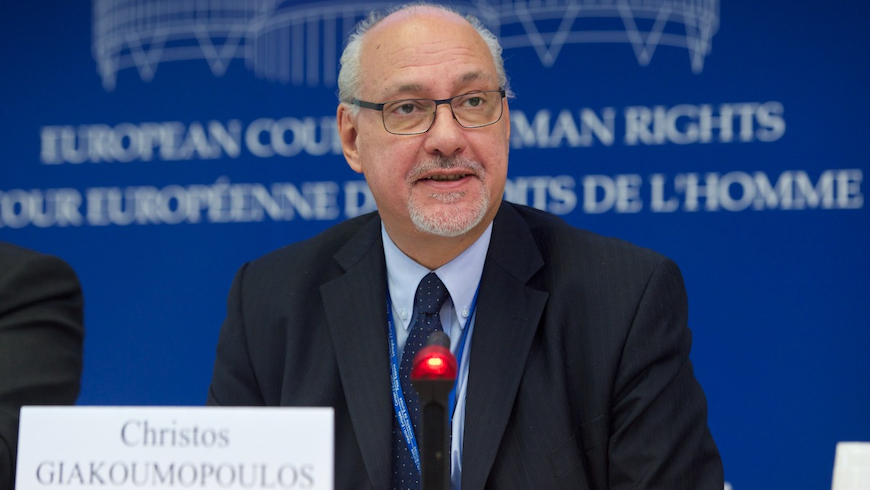Speaking notes by Christos Giakoumopoulos when delivering Norman Bishop’s post-mortem Pro Merito Medal to Ambassador Mårten EHNBERG, Permanent Representative of Sweden to the Council of Europe
25th Council of Europe Conference of Directors of Prison and Probation Services
9 November 2020, Strasbourg
How does change happen? Is it enough to agree on something on paper in order for it to occur in practice?
These were the questions I asked myself when preparing to deliver this speech.
The Council of Europe bodies have produced, in the course of its 70 years of existence, numerous texts: conventions, protocols, recommendations, resolutions, judgements, reports and so on. Is this enough to change our societies?
Definitely not, this marks only the start of a process, we need people to carry and spread around them the message of change and convince others to join their efforts in this endeavour. This is what makes our Organisation great: the numerous excellent experts and civil society organisations we are working with, who are our ambassadors and via whom our standards and principles reach the hearts and minds of people in Europe.
Norman Bishop was such a man, carrying during his long and meaningful life the message that all persons need to be treated with respect and care, even the worst criminals, because to change a person one needs first to show proof of understanding and respect.
He was instrumental in drafting such important texts as the European Prison Rules of 1987, the Committee of Ministers Recommendation on community sanctions and measures of 1992 and a number of other texts which served as models for changing national legislation and practices not only in our member States but also worldwide.
He was also an important and persevering messenger visiting prisons and urging national authorities to amend rules and mentalities, to invest in selection and training of staff and in rehabilitation and reintegration of prisoners.
And he was in constant contact with the Council of Europe after having left our Organisation in 1970 to go and work in Sweden until his retirement as Head of Research and Development at the Swedish Prison and Probation Service. He continued his missionary work after his retirement in 1986 and almost until the end of his life with conviction, dedication and good will. These qualities inspired a number of professionals across Europe to follow his ideas and his passion and to initiate reforms in their penitentiary systems.
It is with great pleasure that I am handing out to Ambassador Mårten EHNBERG, Permanent Representative of Sweden to the Council of Europe, the Pro Merito Medal in memory of Norman Bishop’s contribution to the Council of Europe’s work in the penitentiary field.
BACKGROUND INFORMATION
BISHOP HAS CONTRIBUTED QUITE SUBSTANTIALLY TO THE COUNCIL OF EUROPE WORK IN THE PENITENTIARY FIELD. HIS CAREER STARTED AS PRISON GOVERNER IN ENGLAND AND WALES AND AFTERWARDS AS HEAD OF THE PRISON SERVICE COLLEGE; HE LATER JOINED THE COUNCIL OF EUROPE SECRETARIAT AS HEAD OF THE DIVISION OF CRIME PROBLEMS, LEGAL AFFAIRS DIRECTORATE AND DURING THE LAST PART OF HIS PROFESSIONAL CAREER UNTIL HIS RETIREMENT IN 1986 HE WAS HEAD OF RESEARCH AND DEVELOPMENT AT THE SWEDISH NATIONAL PRISON AND PROBATION SERVICE. SINCE HIS DEPARTURE FROM THE COUNCIL OF EUROPE IN 1970 HE CONTINUED UNTIL RECENTLY TO BE INVOLVED AS AN EXTERNAL EXPERT IN THE WORK ON NUMEROUS TEXTS AND ASSISTANCE PROJECTS. BISHOP’S VOICE AND EXPERTISE HAVE BEEN INFLUENTIAL FOR THE ELABORATION OF A NUMBER OF VERY IMPORTANT TEXTS SUCH AS THE EUROPEAN PRISON RULES OF 1987, THE COMMITTEE OF MINISTERS RECOMMENDATIONS ON CONDITIONAL RELEASE (PAROLE); ON LONG-TERM PRISONERS AND LIFERS; ON STAFF CONCERNED WITH THE IMPLEMENTATION OF SANCTIONS AND MEASURES; ON COMMUNITY SANCTIONS AND MEASURES (ALL CONTAINED IN THE COMPENDIUM). HE WAS NOT ONLY CONTRIBUTING TO DRAFTING STANDARD-SETTING TEXTS OF OUR ORGANISATION BUT ALSO TO THEIR WIDESPREAD PROMOTION AND TO THE IMPLEMENTATION OF THEIR PRINCIPLES BY THE NATIONAL PRISON AND PROBATION SERVICES IN NEW MEMBER STATES SUCH AS RUSSIA, UKRAINE AND ALBANIA. AS ANOTHER COUNCIL OF EUROPE EXPERT, ROB CANTON NOTES IN HIS PERSONAL POST MORTEM TRIBUTE TO HIM: “ BISHOP WAS DEEPLY RESPECTED AT THE COUNCIL IN STRASBOURG, FOR HIS PERSPICACITY, CLARITY, ELOQUENCE AND MANIFEST INTEGRITY. HE WAS AN INFLUENCE IN THE COUNCIL FOR PENOLOGICAL CO-OPERATION (PC-CP) OVER MANY YEARS.” ANOTHER COUNCIL OF EUROPE EXPERT, PIERRE TOURNIER NOTES THE FOLLOWING IN A TRIBUTE WRITTEN IN 2006: « BISHOP PORTE LA BONNE PAROLE EN EUROPE, VISITE LES PAYS DE L'EST, JAUGE PRISONS ET SYSTEMES PENITENTIAIRES... »




